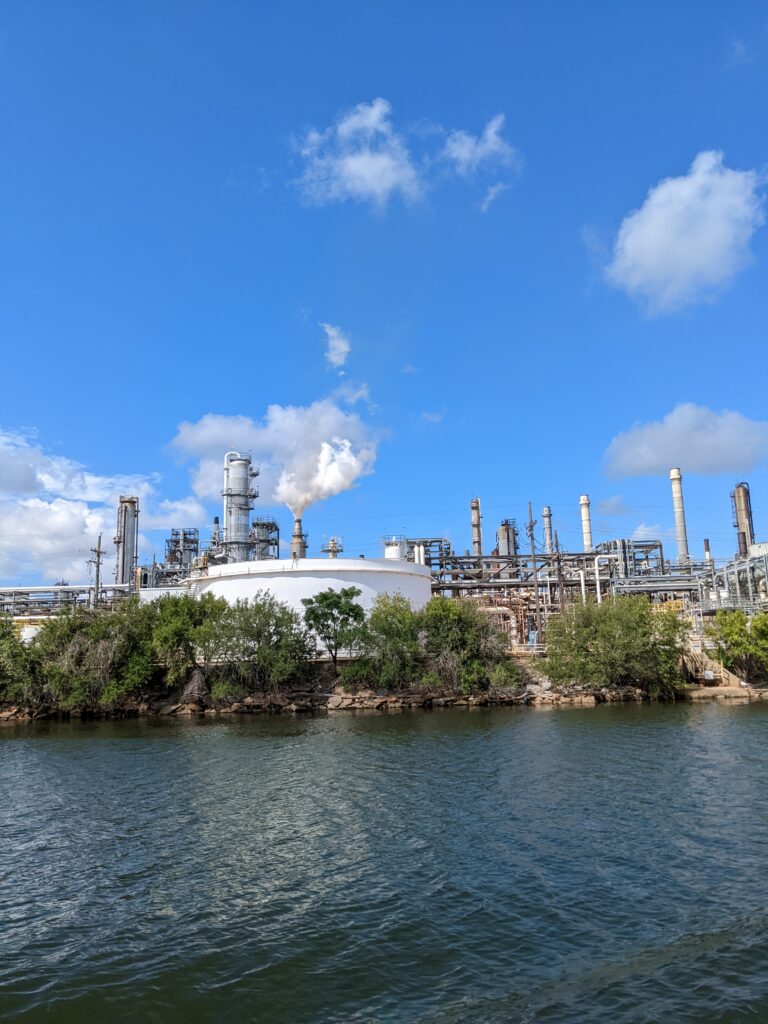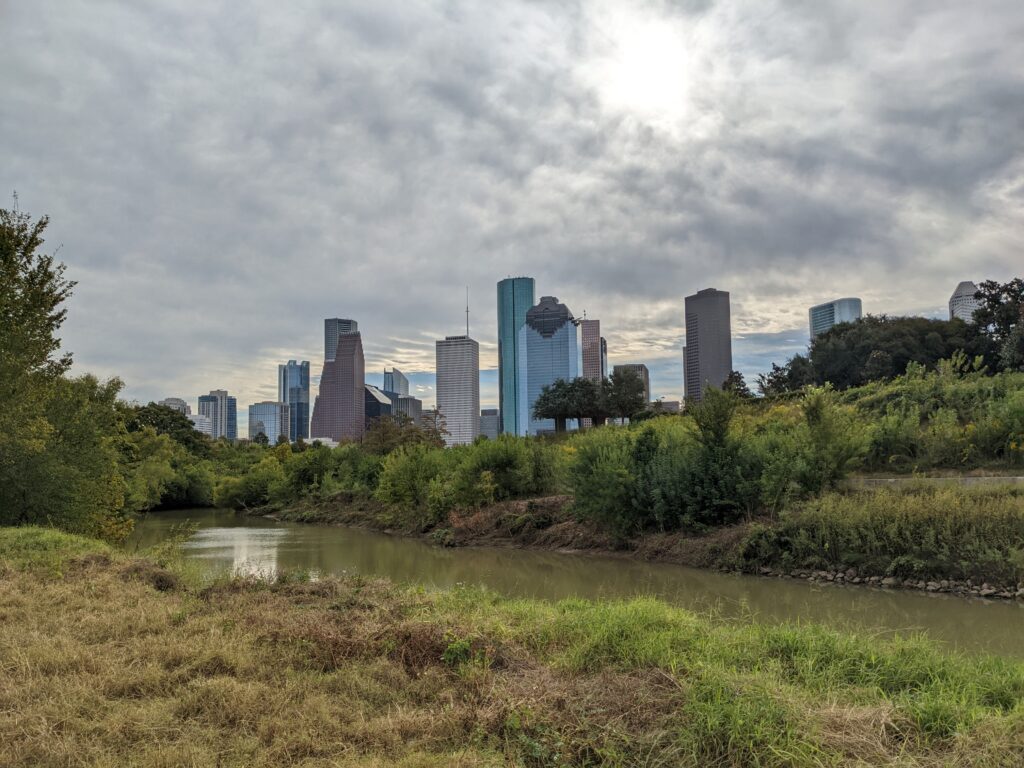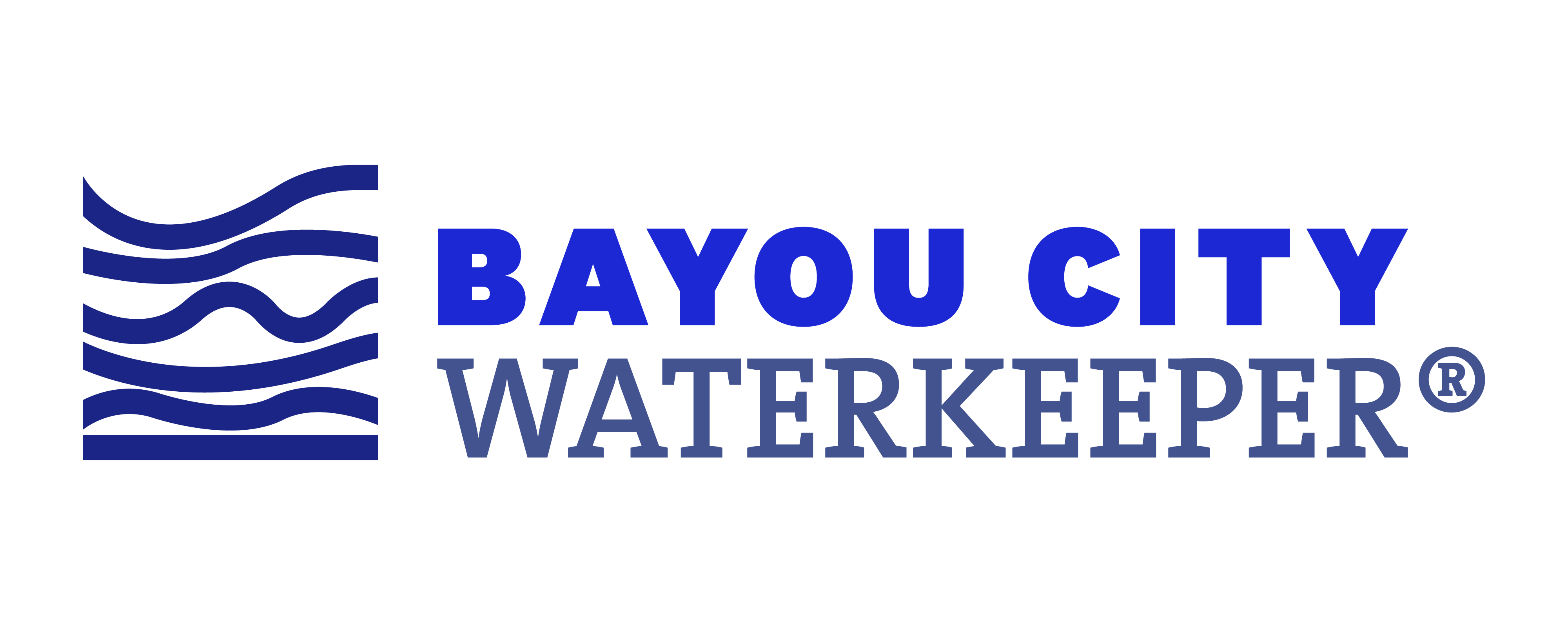This piece by our Senior Legal Director and Waterkeeper Kristen Schlemmer was part of the newsprint accompanying Artist-in-Residence Fred Schmidt-Arenales’ film about the Ike Dike, which was exhibited at the Storefront for Art and Architecture earlier this spring.
On walks toward Houston’s Buffalo Bayou, a row of live oaks shades me from the brilliant sun. I wind toward sycamores filled with bird-skitters and insect-chirrs, and spot redbuds just beginning to bloom, before I see it: the mud-colored water, flowing slowly in the sunlight. Alligator gar and catfish swim under the silty surface. Herons and egrets keep watch on the banks. The water is undeniably life-giving in a more natural state, supporting human existence here for thousands of years. But after over a century of irresponsible development in this rain-abundant region, so much water also poses an existential threat.
As Buffalo Bayou winds east toward Galveston Bay before spilling into the ocean, it passes freeways, curves around downtown, then shapeshifts into something unrecognizable: the Houston Ship Channel. Its natural bends straighten. Its banks become metal and concrete. Barges carry shipping containers, equipment, and tangled metal for miles along a dredged and channelized corridor. The waterway retains nearly none of its natural character.

Apart from catching glimpses of the water from bridges, I’ve been able to visit this waterway only once, on a boat tour arranged a month ahead through the Port of Houston. The sky was deceptively blue as the air felt thick with diesel and grit. Even with an N95 mask, after 90 minutes on the boat, I developed a cough that lasts a week. I doubted many fish could survive this, yet pelicans and seagulls flew hungrily overhead.
Along the water nine refineries operate around-the-clock next to hundreds of petrochemical facilities and thousands of storage tanks containing unknown chemical slurries. Last year the facilities here were responsible for at least seven disasters, including six fires. Chemicals like chlorides, sulfides, nickel, benzene, and polychlorinated biphenyls infuse the Ship Channel’s water. The influence of tides means the water flows both ways, and some of what is dumped here likely reaches the stretch of Buffalo Bayou closest to my home.
From the water the Ship Channel appears antithetical to life, but neighborhoods interweave the massive industrial complexes and in some cases, precede the industrial development by generations. In the communities here, families are periodically asked to shelter-in-place. In Manchester, where residents face elevated cancer risks, the playground is painted Valero teal-and-yellow, and in Galena Park, the daughter of an acquaintance was born with cancer. As a mother to a similarly-aged daughter, this haunts me.
Living in these neighborhoods, where many families have been for generations before it looked anything like this, means living with elevated risks of cancers and heart and lung diseases and shorter life expectancies. That most of the people in these communities are lower-wealth and racialized as Black and Brown makes this an issue of environmental justice. Amnesty International recently concluded “irresponsible operating practices by petrochemical companies along the Houston Ship Channel undermine the enjoyment of several human rights.”

When outsiders ask why people don’t move, I consider that my in-laws grew up here, in Denver Harbor, and they did move to other parts of Houston. Yet my husband still considers Denver Harbor home. These communities represent home for so many people.
Given our changing climate, the need for a transition away from fossil fuels should be incontestable. Inside the Houston Ship Channel, it becomes obvious that a transition means a complete redesign, as this industrialized stretch of bayou is liberated from the petrochemical facilities that form its core purpose. With dread-lined hope, I wonder what could come of this transition. Can we undo our past’s mistakes? Can we treat people with basic dignity? Can we return the Ship Channel to the bayou it once was? Can we restore its life-giving nature?
Kristen Schlemmer is the Senior Legal Director and Waterkeeper at Bayou City Waterkeeper in Houston, Texas, and will be on sabbatical leave through October 7. Bayou City Waterkeeper protects waters and people through bold legal action, community science, grassroots policy, and arts to further justice, health, and safety. Bayou City Waterkeeper leads the Surge Forward coalition focused on reimagining and acting toward alternatives to the $57 billion Ike Dike and has an active litigation docket dedicated to reducing industrial risks across the greater Houston region.
